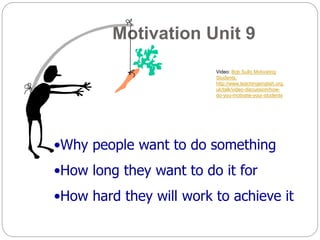
Motivation
- 1. Motivation Unit 9 1 Video: Bob Sullo Motivating Students, http://www.teachingenglish.org. uk/talk/video-discussion/how-do- you-motivate-your-students •Why people want to do something •How long they want to do it for •How hard they will work to achieve it
- 2. TKT: How do we motivate learners? 2 Listen to student feedback using a class suggestion box or short questionnaire. Train students to use reference resources to help them study successfully on their own. Think about how you tell students about their progress. How can you encourage or praise them? A. encourage learner autonomy B. find out what students think C. make your feedback positive D. build variety into your teaching
- 3. TKT: How do we motivate learners? 3 Put students into new groups for different activities? Give comments on students’ work which are helpful and enable them to feel progress. Don’t always do the same things in the classroom. Try new routines. • A. encourage learner autonomy • B. find out what students think • C. make your feedback positive • D. build variety into your teaching
- 4. How do we build motivation? 4 We build rapport! We evaluate together. We build confidence! We provide opportunities!
- 5. Intrinsic Motivation 5 The desire to learn comes from within. Younger children and older students typically have more intrinsic motivation. learner autonomy independence self-confidence Think and discuss: What is the difference between intrinsic and extrinsic motivation? What motivates your students? Task 4: Motivation Techniques
- 6. Factors which Affect Intrinsic Motivation 6 Challenge: (personally meaningful goals ) Control: learners like to control their learning. Fantasy: (imagination) Competition: (performance comparison) Cooperation: (group performance achievement) Recognition: (for accomplishments)
- 7. Extrinsic motivation 7 When someone other than the learner provides the motivation. Positive Reinforcers (rewards) Parents give money, privileges, affection, time together… Teachers give candy, praise, stars, stickers, points and happy dollars (incentives) See Alfie Kohn video, Alfie Kohn bad news Negative Reinforcers Teachers and parents also use shouting, noise, extra homework, punishments, no TV, no free time, (avoidance behaviors)
- 8. Behaviorists 8 Pavlov: experiments with dogs and salivation as response to stimuli, classical conditioning Thorndike: cats and puzzle boxes Skinner: operant conditioning, behavior analysis BEHAVIOR MODIFICATION As teachers we use behavior modification techniques with young learners to form study and social habits. In higher grades we use grades as leverage. See grades have personalities video
- 9. Social Learning Theory 9 Students learn from modelling what they see From the teacher. From other students, In group situations. From the media. Albert Bandura’s Bobo doll experiment See Albert Bandura video What does this have to do with my class or teaching situation? See video children see children do
- 10. Humanism: Abraham Maslow 10 Maslow’s Hierarchy of Needs. Self-actualization Need for self esteem Need for belonging Need for Safety Physiological needs (survivial) Being need Growth needs Deficiency needs See Maslow video
- 11. Attribution Theory excuses, justifications and motivation 11 How people explain outcomes and behaviors. External or situations Climatic conditions Noise level (environment) Comfort Internal or dispositional How they feel Intelligence Self-efficacy: perception of ability to reach a certain goal Uniqueness
- 12. Constructivists and L2 learning 12 Piaget, physical maturation by stages Vygotsky, social interaction, zpd Bruner, discovery learning Krashen: comprehensible input
- 13. 13
- 14. Zone of Proximal development 14 Through humans Through books Through art Through supplementary materials With your group, work out the best option to work together to create a PPT on the topic you have chosen with your: Learning Team Charter
- 15. Krashen: Comprehensible Input 15 According to Krashen and Terrell, the foundation of the natural approach for Language Learning has four principles: (1) comprehension precedes production; (2) production must be allowed to emerge in variable stages; (3) the course syllabus must be based on communicative goals; (4) the activities and classroom environment must work together to produce a lowered “affective filter.”
- 16. Motivational “Commandments” 16 Be motivated as a teacher. Provide a relaxed atmosphere. Present a variety of tasks. Establish a good relationship with students. Increase learner’s self-confidence. Personalize the learning process for individual students. Be aware of short and long term goals.
- 17. Motivated Students 17 Persist at a task Come back to the task voluntarily Desire high levels of performance Vary from individual to individual and task to task
- 18. Unmotivated Students 18 Bored!! They do not see the connection between the task/subject and real life. Uninterested in the topic or task Think the material or task is too hard Think they lack the ability to perform, have little confidence in their abilities Afraid of evaluation and failure Cambridge Task 1: Motivation
- 19. Factors which Affect Intrinsic Motivation 19 Challenge: (personally meaningful goals ) Control: learners like to control their learning. Fantasy: (imagination) Competition: (performance comparison) Cooperation: (group performance achievement) Recognition: (for accomplishments)
- 20. Motivate your students! 20 Challenge Have personally meaningful goals Make attainment of goals probable but uncertain. Give enroute performance feedback. Relate goals to learners' self esteem. View module 7 Learning Strategies
- 21. Motivate! 21 Control Learners like to control their learning. Relate activities to real life situations. Allow for Fantasy Touch learners’ inside where they dwell. Make a game out of learning. Use imagination.
- 22. Motivate! 22 Competition (performance comparison) Competition is more important for some people than for others. Losers may suffer more than the winners profit. May reduce the urge to be helpful to other learners. Have students compete against themselves to gadge their progress.
- 23. Motivate! 23 Cooperation and collaboration (group performance achievement) occurs naturally as well as artificially. is more important for some people than for others. is a useful real-life skill. requires and develops interpersonal skills.
- 24. Motivate! 24 Recognition Satisfaction from recognition of accomplishments. Recognition differs from competition in that it does not involve a comparison with the performance of someone else.
- 25. Don’t motivate, engage! 25